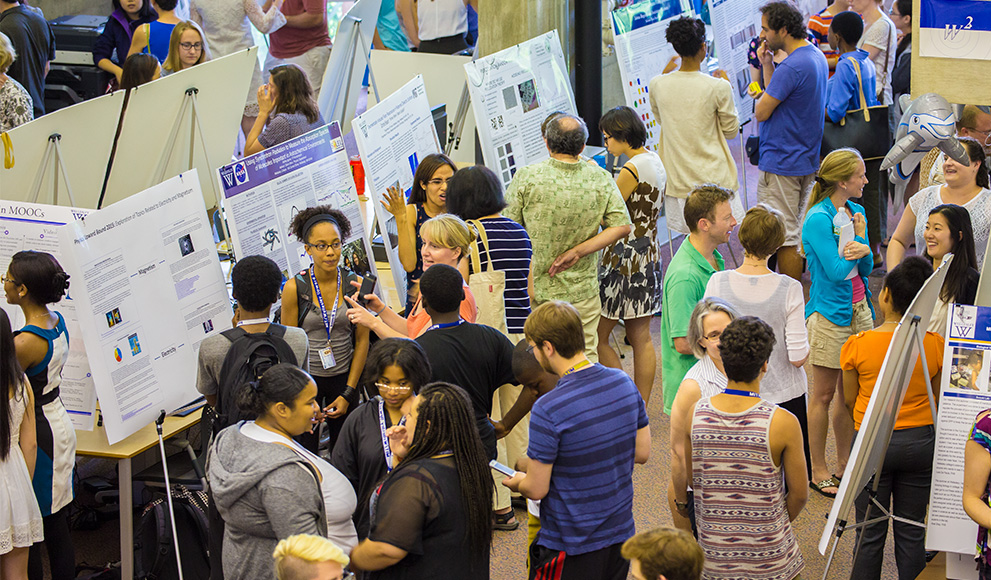Students’ Summer Research Displayed at July 30 Science Center Poster Presentation

The Wellesley Summer Research Program gives students the opportunity to work on a variety of projects, fully funded, under the direction of College faculty. The program culminates each summer in a poster session that highlights students’ research. On July 30, the Wellesley College Science Center welcomed students, faculty, and visitors for this year’s poster presentation.
“The poster session provides an opportunity for students to experience the joys of sharing their findings with their peers, faculty, and visitors,” said Cathy Summa, director of Wellesley’s Science Center. “Students who participate in the research program consistently cite this experience as one of the highlights of their Wellesley experience, and many say that getting involved in research was key to their persistence in STEM majors.”
The more than 100 posters on display this year focused on a range of topics. In the natural sciences, these included: the biomechanics of fish locomotion; the safety of urban-grown fruit; using Wellesley’s 24-inch telescope to detect undiscovered planets; and developing nanomaterials for cancer therapies, to name just a few. Other posters highlighted social science projects and crossover projects, on subjects including domestic violence, negativity and task performance, and the use of seed kits to promote STEM education in secondary schools in East Africa.
Several students from Framingham High School also participated in the poster presentation, as did students in the MIT/Wellesley Upward Bound Program, which aids in the academic development of low-income or first-generation students who are not traditionally considered college-bound.
Victoria Boyd '12, who majored in chemistry at Wellesley, teaches biology, chemistry, and physics for the six-week Upward Bound summer program. She taught 20 students from the Cambridge Rindge and Latin High School, guiding their creation of three posters based on subjects they had studied.
"The poster presentation was impactful because it helped students imagine themselves studying science in the future," Boyd said. "Quite a few students are now interested in psychology and brain abnormalities that affect personality disorders because they had such meaningful conversations with professors about the topics they had researched."
Alexa Pagliaro '18 was one of three students who studied song learning in zebra finches as a model for human speech, under the guidance of Sharon Gobes, assistant professor of neuroscience. The pair worked together every day via Skype. Pagliaro spent the first six weeks developing an experiment that would test the role of gene transcription in memory formation in zebra finches, and two weeks analyzing the data.
"Working so closely with a professor is one of the most valuable aspects of this program," Pagliaro said. "It was a great balance between receiving incredible mentorship and guidance from Professor Gobes while also maintaining a sense of independence and confidence in my own abilities and ideas."
She continued, "Some of the most important lessons that I learned were how to critically analyze not only our work, but also previously published work in the field, and also how to troubleshoot."
Gobes agreed. "The students in my lab really excelled this year in running their projects independently, which is a big step in becoming a good scientist," she said.
At the poster presentation, Pagliaro confidently answered questions about her work, titled "Hemispheric dominance underlying memory formation in zebra finch NCM." She also explained that the experience of doing in-depth research has confirmed her desire to major in neurobiology, and obtain an advanced degree in that field, rather than continuing with pre-med. "As a scientist you have to be critical, innovative, and persistent, among other things. I have learned so much about how a lab functions and the research process itself, valuable lessons that I will use moving forward in my scientific career."
